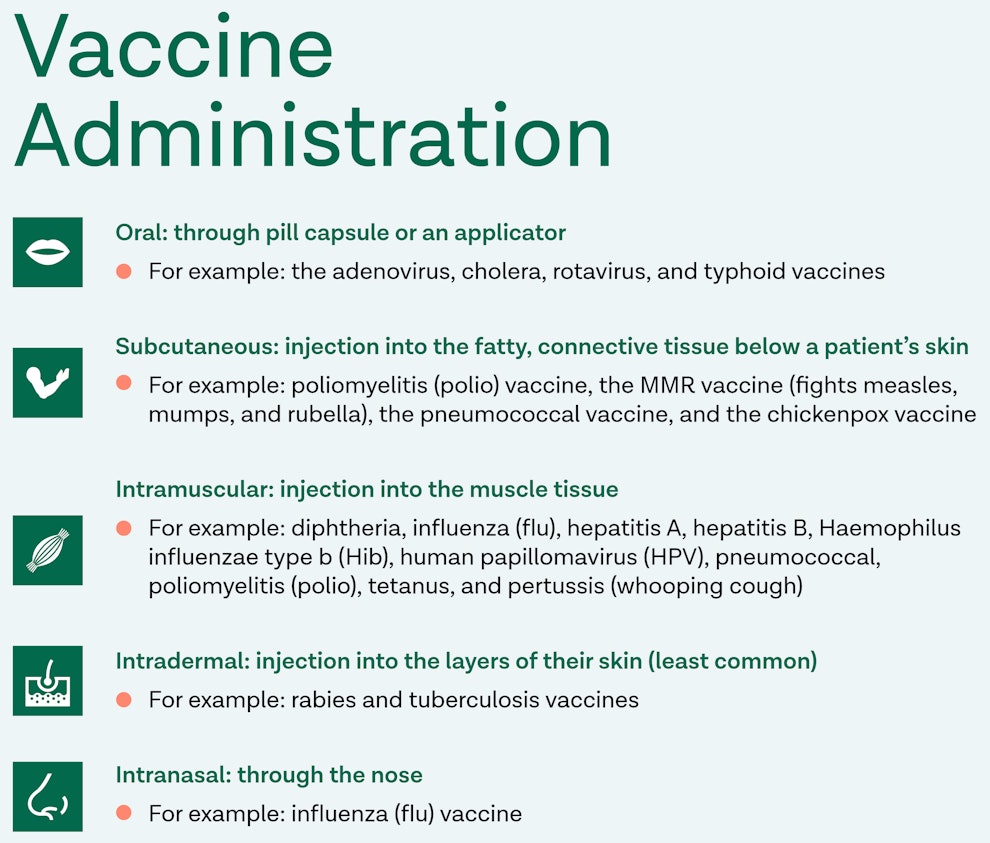Influenza Vaccine for Older Adults: General Information, Debunked Myths, Costs, and More
Article at a glance
Over time, flu vaccines have become a critical part of preventive care and medicine. To learn more about preventive care and how a flu vaccine plays a part in that, read this section.
There are common misconceptions surrounding the influenza vaccine’s safety and efficacy. For example, many believe that the flu vaccine infects you with the flu virus itself. To learn more about common flu myths and how they’re debunked, read this section.
Many harmful myths stemming from false reports or debates have confused many on whether the flu vaccine is safe. In addition to these myths, old wives tales have been guiding many on healing for decades. To uncover the truths about these harmful myths and age-old wives tales, read this section.
Knowing the cost of a vaccine and the healthcare benefits associated with that cost is essential for patients. To learn more about the costs associated with the flu vaccine, read this section.

As we age, we grow more vulnerable to common illnesses like the flu. Those who are ages 55 and older are at a higher risk of developing serious complications from the flu due to their immune systems weakening from age. With older populations being more susceptible to adverse complications from weakened immune systems or co-symptomatic chronic conditions, getting vaccinated is crucial. The influenza vaccine is one of the best preventative measures a senior can take to protect themselves from the dangerous common virus known as the flu.
Flu Vaccines and Preventative Care
Preventive care covers any routine service whose goal is to prevent future illnesses, conditions, or diseases. Certain routine services include but are not limited to recommended vaccinations, screenings, and/or check-ups. An example of preventive care would be a patient visiting their dermatologist once a year to screen for any cancerous moles or skin patches. Another example would be patients over the age of 50 getting a colonoscopy to screen for any issues in their colon. Preventive care is a major goal for healthcare professionals because it allows them to help their patients stop any problems before they even begin.
In regards to the flu vaccine in particular, it’s critical for patients to include this vaccine within their annual care plan. Throughout the years, the flu vaccine has become a key component of preventive medicine as it helps protect patients from getting the virus during flu season. The influenza virus is complex and has developed over 130 possible strains since it originally spread. Due to this vast amount of strains, it takes a large team of people to research and analyze the virus each year and predict which strains will dominate the flu season. Because of these predictions, the flu vaccine changes each year and therefore, it’s recommended that patients receive their flu vaccine annually. Especially for older patients or those with weakened immune systems, it’s crucial that the flu vaccine is included in an annual care plan. Receiving the vaccine yearly can prevent patients from catching the virus or developing the serious complications that often stem from becoming ill with the flu.
Preventive Care Tips
If you’re not sure where to start when it comes to developing an annual preventive care plan, here’s some tips to keep in mind.
Speak With Your Doctor: As with any healthcare practice, it’s important to consult with your primary care physician and talk through a plan that would work best for you. Discuss any chronic conditions you might be worried about or discuss any concerns you might have about certain medications or vaccines. Mention your priorities as a patient and ensure that any questions are cleared up before leaving.
Research and Plan: Research some questions or concerns on your own time to see what certified sites say online or what patients are saying in online forums. Then, in order to optimize your annual check-up, plan out what you want your visit with the doctor to look like. Write down any questions or concerns you may have so you don’t forget them during the appointment, including any surrounding costs or medical benefits. One of the advantages to Oak Street Health is that our team is willing to schedule longer appointment times to accommodate any and all questions you have. Not to mention, our team is ready and willing to walk through any costs or medical benefits listed in your plan so you can fully understand what you’re eligible for.
Location: While many pharmacies offer flu vaccines, a patient can maximize their annual check-up by receiving their flu vaccine during that appointment. By getting your flu shot from your primary physician, you’re killing two birds with one stone while also getting care from a doctor you know and is aware of your healthcare wants and needs. Not to mention, Oak Street Health offers transportation for any customers in need of a ride to and from the facility.
General Information FAQs
Does the flu vaccine give you the flu?
While a flu vaccine may cause minor side effects such as muscle aches, headaches, or a low-grade fever, the vaccine does not cause the flu. When a patient is vaccinated for the flu, they receive either a killed or weakened strain of the virus and thus, are unable to contract the flu from it. The flu shot, given with a needle, contains a killed virus while the nasal spray contains a weakened version of the virus. Minor side effects may occur solely because the vaccine is triggering an immune response. This means the vaccine is alerting the immune system to fight it off, then allowing it to remember how to fight the real virus in the future if contracted.
While the flu vaccine does aid in preventing a patient from contracting the flu, it does take up to two weeks to activate in the body. This means that during that two-week window, it is still possible for a patient to get the virus and become sick.
Are there treatments available if I get sick with the flu?
Yes, if a patient gets the flu, antiviral drugs are available to aid the patient while sick. Antiviral drugs are known to lessen flu symptoms, shorten the time that a patient is ill, and prevent serious complications, such as pneumonia, from occurring. Patients who are immunocompromised or are 55 and older could be at high risk of developing serious flu complications if they contract the virus. A patient in one or both of these categories should speak with their doctor before flu season to develop a plan for if they get sick.
Is there only one type of flu vaccine available for me?
There are several vaccine options a patient can choose from but some are recommended for different age groups. Specifically for those 65 and older, either a high-dose flu vaccine or an adjuvanted flu vaccine is recommended.
Vaccine Options for Those 55 and Older
Standard-Dose Quadrivalent Shot
Afluria Quadrivalent, Fluarix Quadrivalent, FluLaval Quadrivalent, and Fluzone Quadrivalent are all considered standard-dose influenza shots. These four vaccines are approved for those over six months of age and Afluria Quadrivalent is licensed to be administered either by needle (for those over six months) or by the jet injector (for those between 18 and 64). Influenza shots in this section include the “residual cell culture materials” mentioned above because the virus is grown in eggs. Growing a virus or bacteria in eggs increases the manufacturing capacity for a vaccine.
Quadrivalent Cell-Based Shot
Flucelvax Quadrivalent is the only cell-based vaccine, meaning that its virus is grown in cell culture and is completely egg-free. This shot is licensed for those over four years of age and is primarily administered to those with egg allergies.
Recombinant Quadrivalent Shot
Flublok Quadrivalent is the only recombinant vaccine meaning that it was created from recombinant DNA technology, allowing it to be egg-free. This vaccine is licensed for those over 18 years of age and is primarily given to those with egg allergies.
Vaccines Recommended for Those 65 and Older
High-Dose Quadrivalent Shot
Fluzone High-Dose is the only high-dose quadrivalent shot. The difference between Fluzone (standard-dose vaccine) and Fluzone High-Dose is that Fluzone High-Dose contains four times the antigen included in the standard Fluzone vaccine. The reason for increasing the antigen amount is to stimulate a stronger immune response in older generations, thus better protect them from the flu.
Adjuvant-Based Quadrivalent Shot
An adjuvant is used in vaccines to stimulate a stronger immune response. The common adjuvant used is aluminum salts which are also found in drinking water, infant formula, antacids, aspirin, etc. An example of an adjuvant-based influenza vaccine is FLUAD Quadrivalent.
Adjuvant-Based Trivalent Shot
Similar to the adjuvant-based FLUAD Quadrivalent, FLUAD Trivalent contains an adjuvant that stimulates a strong immune response. The main difference between these two FLUAD vaccines is that one fights against four flu strains (quadrivalent) while one fights against three (trivalent). FLUAD Trivalent is an adjuvant-based trivalent vaccine that fights against three flu strains.

What makes the 65+ flu vaccine different from the regular flu vaccine?
The difference between regular flu vaccines and flu vaccines recommended for those 65 and older is that the 65+ version is much stronger. The quadrivalent shots contain four times the antigens than a regular flu vaccine and the trivalent shot contains three times the antigens, thus better protecting the patient. According to the Center for Disease Control and Prevention (CDC), there was a study conducted with 30,000 participants receiving the flu vaccine. Those that were 65+ received the high-dose quadrivalent shot and the rest received a regular flu vaccine. In the end, results showed that those 65+ experienced 24% fewer influenza illnesses compared to those who received the regular flu vaccine.
It’s also recommended for older populations to be up to date with any recommended pneumococcal vaccines. These vaccines help to prevent those 65+ from having serious flu complications that develop into pneumococcal diseases such as pneumonia, meningitis, and bloodstream infections.
Is building natural immunity better than getting vaccinated?
While many believe that developing natural immunity is more effective than getting vaccinated, it also causes a patient to take large risks with their health. Especially with those 55 and older, the flu can be a serious or even deadly virus due to the chance of developing serious flu complications such as pneumonia. It’s much safer to be vaccinated than face the dangers of what the flu can cause or lead to.
What side effects could occur after getting vaccinated for the flu?
Every person’s immune system is different and reacts differently to the flu. Because of our unique responses, there’s a variety of side effects a patient can experience, ranging from nothing at all to feeling nauseous and ill.
Injection Site
Where the shot is given, it’s common for patients to experience aches, soreness, redness, and minor swelling.
Full Body
Full body side effects can include low-grade fever, nausea, headaches, fatigue, dizziness, coughing, sneezing, sore throat, and in severe cases, fainting. Most patients experience mild symptoms that go away within a few days, but as with any vaccine, fainting is possible.
Is it necessary to get vaccinated each year?
Yes because the influenza virus is known to change constantly each year, therefore the vaccine changes each year. Currently, there are four known types of influenza strains marked as A, B, C, and D. Strains A and B are the most common, and when broken down even farther, strain A currently has over 130 classified subtypes while strain B is split between two lineages. Each vaccine contains antigens that cover both strain A and strain B viruses. However, since the virus can form into a large number of strains, scientists study to predict which strains are thought to impact the population each year. Therefore, each year produces a new vaccine that is predicted to most efficiently protect our society thus, vaccinating yearly is necessary.
How long does the flu vaccine help to prevent the flu?
The flu vaccine works to prevent the flu for approximately six months after it is received.
When is the best time to get vaccinated for the flu?
Many health professionals believe that October is the best time to be vaccinated for the flu because flu season is known to be at its peak during the months of December through March.
Can I get the flu even though I am vaccinated?
Yes because a flu vaccine’s efficacy varies from person to person and year by year. Occasionally a person may contract the virus prior to receiving the vaccine or within the two-week window before it’s effective. It’s also possible for a person to contract a strain of the flu that wasn’t predicted for and thus was not put in the vaccine. However, according to the CDC, those that receive the vaccine are less likely to have severe symptoms even if they do become sick.
Are there any other measures I can take to prevent getting the flu?
In addition to the vaccine, there are many measures a patient can take to avoid getting the flu.
Practice Good Hygiene: Wash hands frequently with warm water and soap or use hand sanitizer as needed to protect from germs lingering on commonly-touched surfaces.
Get Good Sleep: A lack of sleep can weaken our immune system causing it to struggle more when fighting off viruses such as the flu. Many professionals say that seven to nine hours of sleep a night is sufficient for an adult. Insomnia is common in older populations so if a patient is struggling with sleep, it’s imperative that they speak with their doctor.
Eat Healthily: Maintaining a good diet balanced with fruits, vegetables, protein, grains, etc. is vital to keeping our bodies healthy and unaffected by illness. Speak with your doctor about your diet to discover what nutrients you may need more of. A healthy diet includes vitamins and supplements that can boost daily performance and better protect from your immune system being compromised.
Debunked Myths
The flu vaccine causes other respiratory illnesses.
Actually, no, flu vaccines are not known to increase a patient’s susceptibility to other respiratory illnesses. In 2012, a study suggested that the flu vaccine might make patients more susceptible to other respiratory infections. Several experts looked into this finding and attempted to recreate similar results but each of their studies turned up no connection between the two. In the end, the CDC claims a large majority of evidence suggests that the finding from the 2012 study is rare.
The flu vaccine increases my risk of getting Alzheimer’s disease or dementia.
A debate was launched around whether the mercury contained in influenza vaccines can lead to a patient developing Alzheimer’s disease or dementia over time. Certain health officials state that it’s possible due to mercury accumulating in the brain year after year. However, the vast majority of health officials claim the latter, proving that the mercury used within flu vaccinations is minute and therefore not harmful. In fact, the Azheimer’s Association and Alzheimer’s Drug Discovery Foundation have conducted their own statements and released statements with a completely different result. Their findings state that the flu vaccine may actually cause a decrease in the likelihood of a patient developing Alzheimer’s disease or dementia.
While more evidence votes in favor of getting the flu shot and depicts the vaccine as safe, seniors who are worried about this can opt to receive the nasal vaccine. The nasal vaccine is not associated with the debate at all as it does not contain mercury.
Does the old wives’ tale “feed a cold, starve a fever” hold any truth?
Not at all, health officials recommend that any time a patient is ready to eat or drink while sick, they should. Eating and drinking fuel the body with the nutrients it needs to fight off any illness and heal. It’s extremely important to stay hydrated and attempt eating in small amounts to avoid malnutrition and other health complications that can stem from illness.
Should I avoid dairy when feeling under the weather?
Medical officials advise that whatever a patient has an appetite for is good to eat. If this means milk and cereal, then that’s perfectly fine. Some people fret that dairy will worsen their mucous secretions. However, becoming dehydrated will only worsen the illness and lead to thicker mucus so go ahead and drink the milk or eat whatever you can stomach.
Is chicken noodle soup a good meal when I’m sick?
Yes, chicken noodle soup can be very beneficial to patients who are ill because it provides a variety of nutrients. The broth helps a patient to stay hydrated while receiving protein, vitamins, and carbohydrates from the other ingredients.
Is it bad to exercise when I’m sick?
Yes and no. A patient should not overwork their body while ill because they do need rest to heal. However, taking a walk outside or participating in light exercise can be beneficial to getting the patient back on track and feeling better.
If I have a fever, will a cold compress or an ice bath help?
Contrary to popular belief, it’s okay to have a fever as it’s your body’s way of fighting off infection. Oftentimes, trying to rush breaking a fever can cause discomfort so unless an ice bath or cold compress is what you’re craving, they’re not necessary.
Does wearing garlic or placing onions and potatoes in my socks help to ease my flu symptoms?
While wearing garlic, potatoes, or onions may not help to prevent colds and illness, eating them can. Garlic is known to have many antioxidants that boost a patient’s immune system while onions and potatoes have several vitamins and minerals like vitamin C to keep a patient healthy.
Does putting Vicks VapoRub on the bottom of my feet aid my congestion?
Due to your feet having larger pores, rubbing Vicks VapoRub on the bottom of them can in fact aid congestion and coughing. The large pores in your feet help your body absorb the ingredients quicker thus aiding the congestion quicker and more efficiently.

Questions About Cost
Does Medicare offer flu vaccine coverage?
Yes and oftentimes, patients with any form of medical insurance, including Medicare, receive their vaccine for free. If concerned about the cost of a flu vaccine speak to your doctor and insurance company to see what options are available for you and what benefits you have.
Note: One of Oak Street Health’s advantages is the support they offer in navigating Medicare benefits. Visit an Oak Street Health location near you or connect with one of our dedicated team members by phone to learn more about your Medicare coverage.
Are there any other senior healthcare benefits that help with the cost of the flu shot?
Seniors who are veterans are able to receive certain healthcare benefits and privileges through the Veteran’s Association. Flu vaccine coverage is one of the benefits provided to veterans through the VA. To learn more about benefits provided by the VA, visit this source.
How can I optimize my annual wellness visits to avoid extra costs?
A great way to save money and time is for a patient to plan and optimize the time at their annual wellness visit. Seniors on Medicare are granted one free annual wellness visit a year in which they can discuss a variety of healthcare needs. Prior to visiting your physician, think through family medical history and record personal medical issues or questions. While in the office, inquire about the factors you recorded, ask about preventive screenings, and ensure you are up to date with any vaccines you are eligible for.
Note: One of the benefits of Oak Street Health is that they provide their patients with the option of speaking with their doctor in person, through video-call, or on the phone. They also offer free transportation to and from the appointment if necessary. Feel free to contact an Oak Street Health location near you to learn more.
Sources
- https://www.cdc.gov/flu/highrisk/65over.htm
- https://www.cdc.gov/flu/prevent/misconceptions.htm
- https://www.assistedlivingct.com/flu-shot-qa-connecticut-seniors-caregivers/
- https://www.seniorsmatter.com/does-the-mercury-in-vaccines-contribute-to-the-early-onset-of-alzheimers-or-dementia/2492433
- https://www.alz.org/aaic/releases_2020/vaccines-dementia-risk.asp
- https://www.alzdiscovery.org/cognitive-vitality/blog/is-there-a-link-between-alzheimers-disease-and-the-flu-shot
- https://www.verywellhealth.com/flu-shots-and-alzheimers-disease-98672
- https://www.prevention.com/health/health-conditions/a25050076/flu-shot-side-effects/
- https://www.goodrx.com/blog/heres-how-to-get-discounted-or-even-free-flu-shots-this-year
- https://www.va.gov/health-care/about-va-health-benefits/
- https://blog.silvercuisine.com/6‑flu-myths-and-facts-for-seniors/
- https://health.ucdavis.edu/health-news/newsroom/the-truth-behind-7-popular-old-wives-tales-about-being-sick/2020/02
- https://riseandshine.childrensnational.org/debunking-old-wives-tales-part-one/
- https://blog.uvahealth.com/2019/09/06/grandma-common-cold-remedies/
- https://academic.oup.com/cid/article/54/12/1778/455098
- https://www.cdc.gov/mmwr/preview/mmwrhtml/rr6207a1.htm
- https://www.immunize.org/askexperts/experts_inf.asp
- https://www.cdc.gov/flu/about/viruses/types.htm
- https://www.cdc.gov/vaccines/vpd/pneumo/index.html
- https://www.cdc.gov/vaccines/vac-gen/additives.htm
- https://www.cdc.gov/flu/prevent/adjuvant.htm
- https://www.cdc.gov/flu/prevent/keyfacts.htm
- https://www.cdc.gov/flu/prevent/qa_fluzone.htm#anchor_1597954317180
Become a patient
Experience the Oak Street Health difference, and see what it’s like to be treated by a care team who are experts at caring for older adults.



